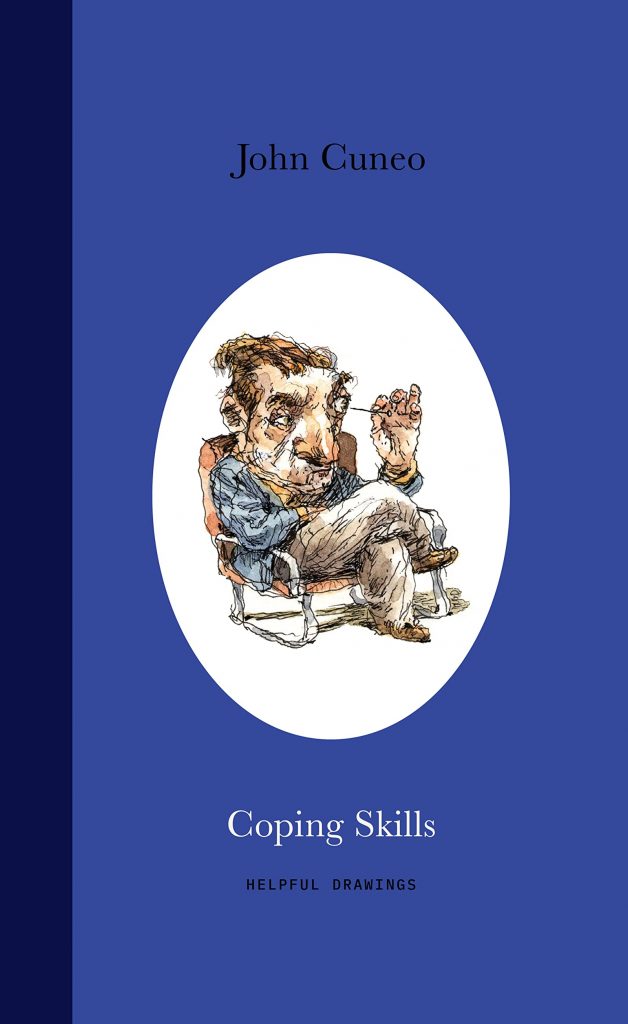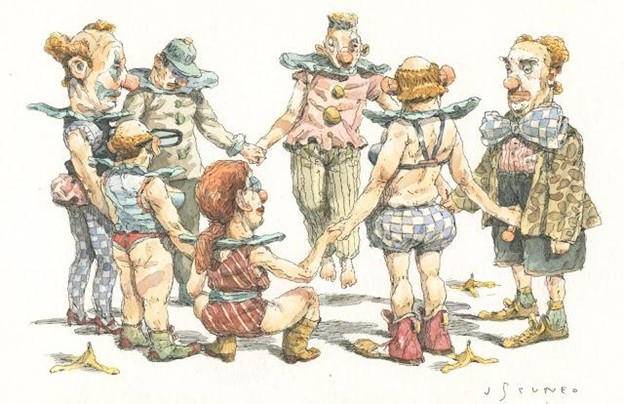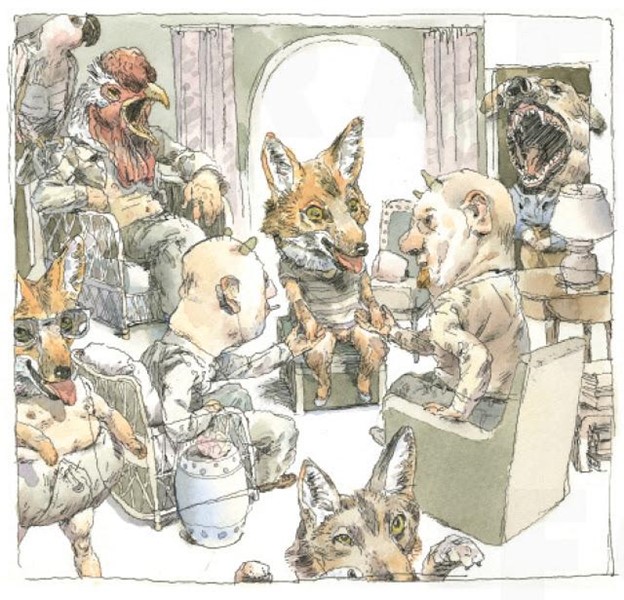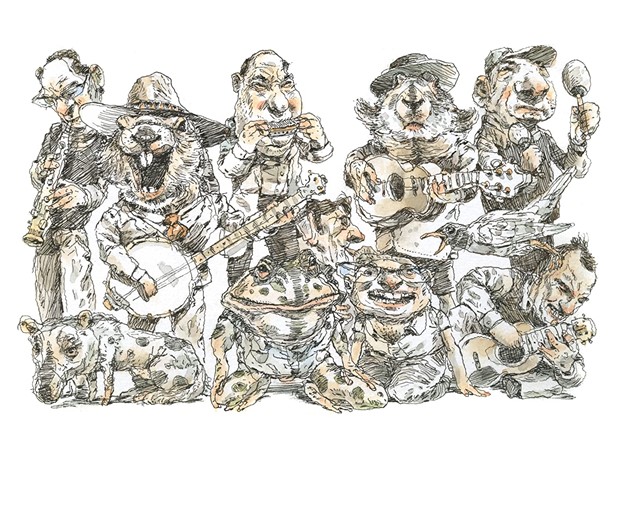
The contents of a person’s subconscious generally rank as the most intimate of life’s mysteries, most especially to ourselves. After all, we’re as familiar with them as can be, living with them day in and day out, yet unless we’ve spent an awful lot on therapy, most of us have only a vague idea (if any) of how they got there and even less knowledge about what the hell to do with them. Unless, that is, you happen to be an artist, in which case a blank sheet of paper and a drawing utensil or two might serve as effective tools for a ritual of self-exorcism.
Or so the theory goes, at any rate — but given the life-long obsessions that have haunted the works of too many artists to mention, one could perhaps make an effective argument that committing them to paper (or canvas) only strengthens their hold. With that in mind, then, it’s tempting to think that “Helpful Drawings,” the subtitle of Coping Skills, the second and most recent collection of miscellany from celebrated illustrator John Cuneo to be published by Fantagraphics Underground, was chosen solely for tongue-in-cheek purposes, but who knows? Maybe these expertly-rendered transmissions from the deepest recesses (I hope) of Cuneo’s id are, in fact, helpful to someone — though probably, that “someone” most likely is, of course, the artist himself.

Culled from a plastic bin in his studio labeled “Loose Sketches,” there’s enough by way of recurring themes in this collection to say that a fairly consistent “through-line” is apparent at first glance, and while these drawings are absurdist on their face, they’re also painfully and acutely in touch with the more desperate undercurrents of the human condition. Sex, particularly male sexual insecurity, is the most obvious example, but low-grade voyeurism, biological and psychological deformity, guilt, shame, and the need for either validation or humiliation (sometimes both at once) all pop up with regularity, as well, and are all run through a metaphorical blender of surrealism and cynicism that renders each illustration at once achingly accurate and hopelessly outlandish. You’ll laugh, you’ll cry, you’ll laugh so hard it makes you cry, and you’ll cry so hard it makes you laugh. Who could ask for a more fulfilling way to spend one’s Friday or Saturday night than that?
All half-assed attempts at frivolity aside, though, there’s really no bad time to immerse yourself in Cuneo’s scratchy, squiggly, deliriously exaggerated (big heads, big tongues, big limbs, and especially big genitalia) world, because, like it or not, it’s our own world — albeit reflected back at us via fun-house mirror distortion, and stripped clean of all traces of cloying, syrupy sentimentality. Indeed, there’s a savage and incisive wit that’s either right on the surface or never far from it in almost all of these works, a kind of tacit acknowledgement, maybe even an assumption, that we’re a fallen species, always have been, and may as well get over it and try to have a good time. To call Cuneo’s point of view mean-spirited would, I think, be too dramatic and severe by any stretch, but he’s plainly a realist, even if his art style would lead you to assume otherwise. Heck, I might even go so far as to call him jaded, but only insofar as he seems utterly unimpressed with humanity’s attempts to either dress up our flaws in their Sunday best or, even worse, to hide them away completely.

Taking the opposite tack and putting them “on blast,” as the younger generation would probably say, is perhaps an overly-obvious corrective counter-measure, sure, but that doesn’t preclude it from being a damn effective one, and so, in that respect, I certainly have no problem applauding Cuneo’s decision to “let it all hang out,” especially since there’s at least a small bit of professional risk-taking involved with airing his psychological dirty laundry. I mean, it’s one thing for a cartoonist coming from the underground tradition to release the contents of their visual (and visceral) “secret diaries” for public consumption and quite another for someone who regularly lands cover gigs with The New Yorker and whose work is featured in prestigious gallery shows to do the same. At the end of the day, though, Cuneo’s self-evidently obvious skill, as well as his unique blend of fine art technique with caricaturist sensibilities, will always ensure that he’s in demand. At worst (or maybe it’s for the best?), a book like this might cause him to get a few awkward sideways glances at parties.

Still, if there’s one thing we can hopefully all agree that a collection such as this is good for, it’s clearing out the insufferable squares from the room — both because Cuneo’s stuff will undoubtedly shock all of their deep-seated puritanical sensibilities and, more importantly, because those same puritanical sensibilities are one of the most frequent targets of not just his satire, but his ire. Yet while the overall tone and temperament of Coping Skills could fairly be classified as “acerbic,” the simple truth is that laughing at other people is always a cheap and easy audience-pleaser. What takes considerably more skill is to get people to laugh at themselves. Cuneo ranks as one of the very best around at doing just that, as well as one of the absolute finest illustrators working today, so if you’re game to get one chuckle after another out of a lengthy laundry list of human foibles that all hit pretty damn close to home, you’ll derive a tremendous amount of enjoyment from this book — and feel appropriately guilty for having liked it so much afterward.
SOLRAD is made possible by the generous donations of readers like you. Support our Patreon campaign, or make a tax-deductible donation to our publisher, Fieldmouse Press, today.
SOLRAD is made possible by the generous donations of readers like you. Support our Patreon campaign, or make a tax-deductible donation to our publisher, Fieldmouse Press, today.

Leave a Reply